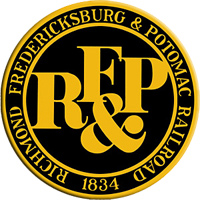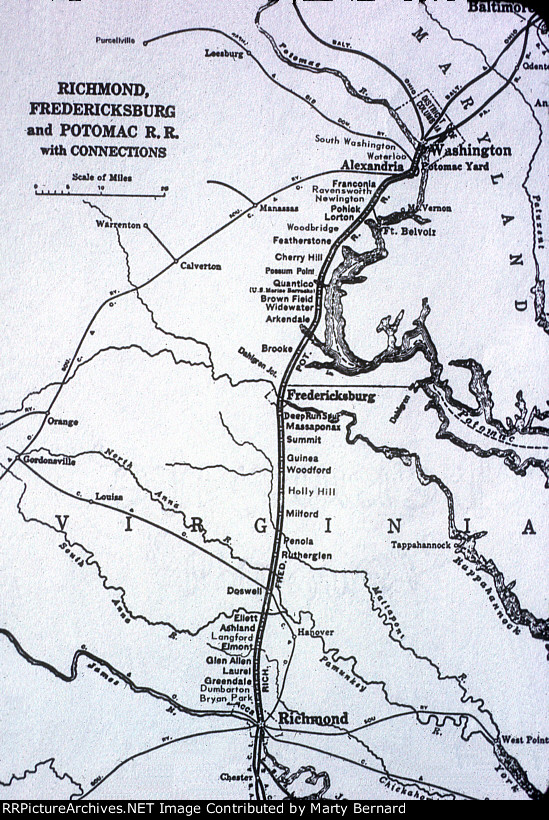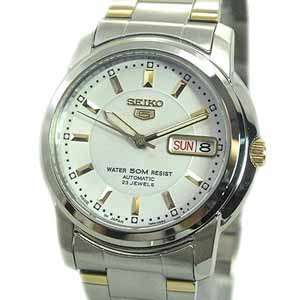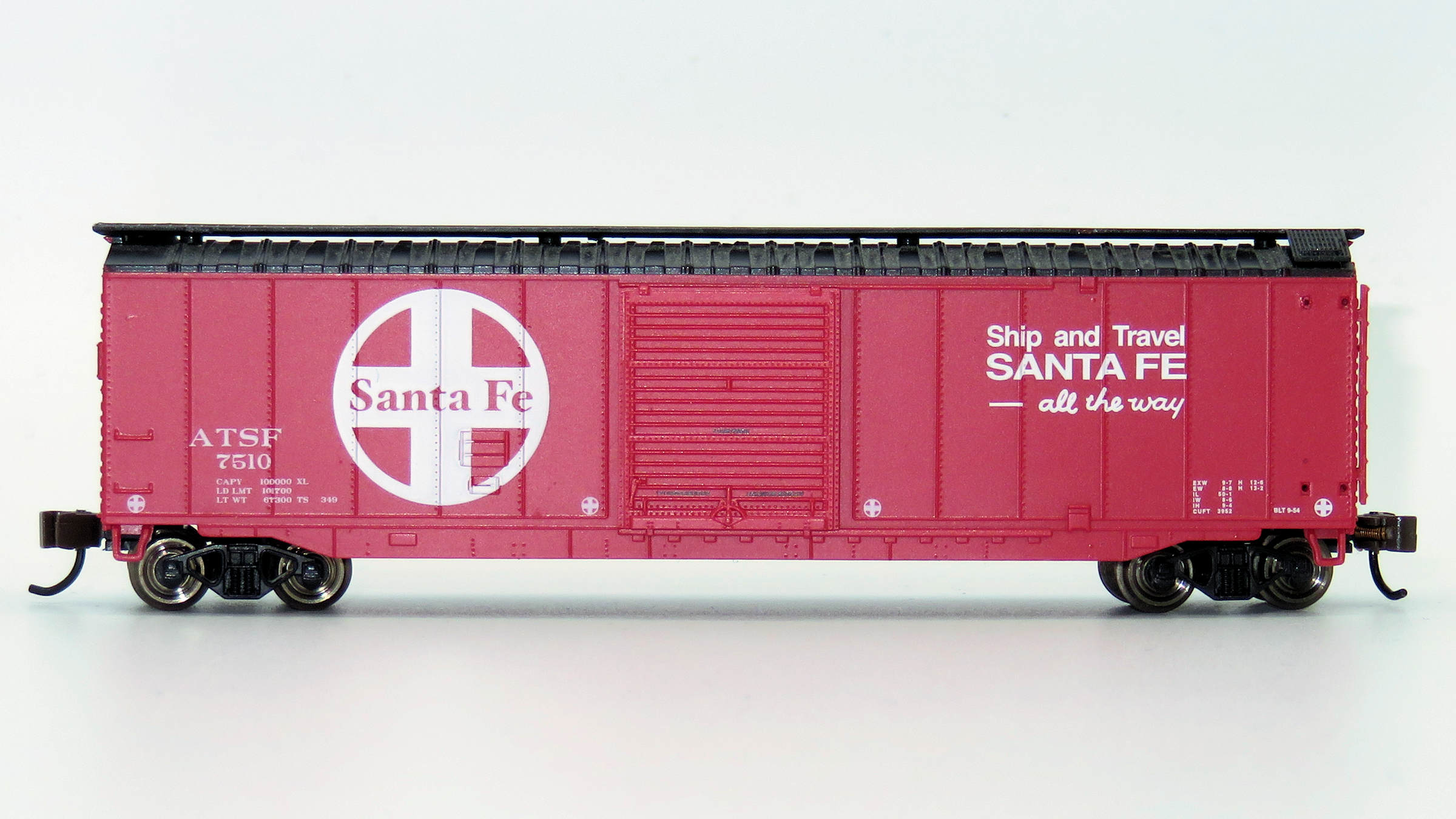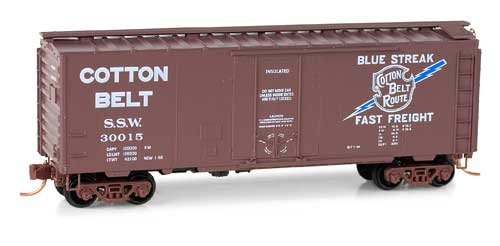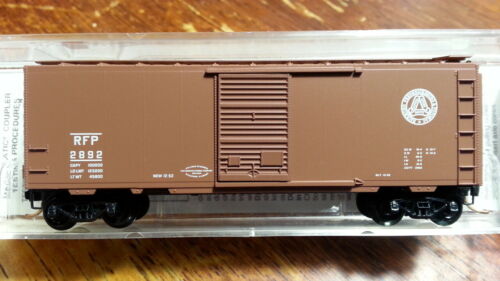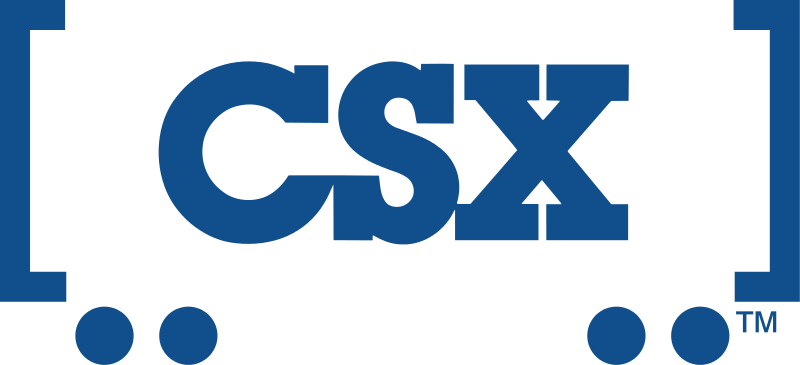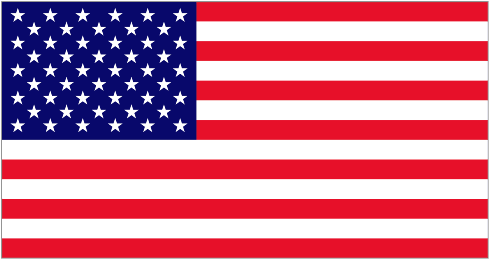Company History: The RF&P ran from Richmond, Virginia north 114 miles to Potomac Yard (known widely as Pot Yard) on the river near Washington D.C. The purpose of the line was to link the Pennsylvania Railroad and Baltimore & Ohio lines to the northeast with the Seaboard Air Line and Atlantic Coast Line lines to the south. There were few branchlines of consequence and the mainline was entirely double tracked with no grades to speak of. It was operated as a single route as early as 1901 although the route north of Quantico actually belonged to a PRR subsidiary called the Washington Southern. RF&P absorbed the Washington Southern in 1920. There were also connections with Southern and C&O but C&O traffic in the area was almost entirely east-west and Southern had their own line to Washington D.C.
Traffic was heavy and fast. Pacifics were used for freight and passenger service. These were supplanted by 4-8-2 Mountains then by Northerns and Berkshires. Aside from some Alco switchers, RF&P was an entirely EMD road in the diesel era. E8’s and FP7’s hauled the passengers (mostly PRR, SAL and ACL trains) while F5’s and F7’s hauled freight with GP7’s in support. The second generation brought GP35’s, and GP40’s for road service. The diesel fleet usually ran just under 40 units for the 114 mile line (indicating very heavy traffic.) As a rule, even numbered units faced north and odd numbered units faced south. Road switchers were equipped with dual cab controls and running long hood forward was common.
By 1987, RF&P’s situation had changed. The former PRR connection had mostly faded as Amtrak operated the line to the northeast and not Conrail. That left the former B&O on the north end and the former Seaboard System on the south end. Both were now part of CSX. RF&P was still a vital link but it didn’t make sense to be a separate railroad. CSX already owned much of the stock but a quarter of the shares of RF&P were owned by the state of Virginia’s state employee retirement fund. In the end, CSX gave the state fund the property rights to Potomac Yard in exchange for all of the stock. Pot Yard originated or terminated very little traffic with nearly every train just running through so the property was ripe for development. In fact there was talk of turning part of the property into a new stadium for the Washington Redskins. In the end, it became commercial property instead. The state was happy and CSX closed the gap on their system map. RF&P merged into CSX in 1991.
Traffic was heavy and fast. Pacifics were used for freight and passenger service. These were supplanted by 4-8-2 Mountains then by Northerns and Berkshires. Aside from some Alco switchers, RF&P was an entirely EMD road in the diesel era. E8’s and FP7’s hauled the passengers (mostly PRR, SAL and ACL trains) while F5’s and F7’s hauled freight with GP7’s in support. The second generation brought GP35’s, and GP40’s for road service. The diesel fleet usually ran just under 40 units for the 114 mile line (indicating very heavy traffic.) As a rule, even numbered units faced north and odd numbered units faced south. Road switchers were equipped with dual cab controls and running long hood forward was common.
By 1987, RF&P’s situation had changed. The former PRR connection had mostly faded as Amtrak operated the line to the northeast and not Conrail. That left the former B&O on the north end and the former Seaboard System on the south end. Both were now part of CSX. RF&P was still a vital link but it didn’t make sense to be a separate railroad. CSX already owned much of the stock but a quarter of the shares of RF&P were owned by the state of Virginia’s state employee retirement fund. In the end, CSX gave the state fund the property rights to Potomac Yard in exchange for all of the stock. Pot Yard originated or terminated very little traffic with nearly every train just running through so the property was ripe for development. In fact there was talk of turning part of the property into a new stadium for the Washington Redskins. In the end, it became commercial property instead. The state was happy and CSX closed the gap on their system map. RF&P merged into CSX in 1991.
Successor/Parent History: CSX Transportation (reporting mark CSXT) is a Class I railroad in the United States. The main subsidiary of the CSX Corporation, the railroad is headquartered in Jacksonville, Florida, and owns about 21,000 route miles (34,000 km). CSX operates one of the three Class I railroads serving most of the East Coast, the other two being the Norfolk Southern Railway (NS) and Canadian Pacific Railway. It also serves the Canadian provinces of Ontario and Quebec. Together CSX and Norfolk Southern Railway have a duopoly over all east-west freight rail traffic east of the Mississippi River. As of October 1, 2014 CSX's total public stock value was slightly over $32 billion.
CSX Transportation was formed on November 1, 1980, by combining the railroads of the former Chessie System with Seaboard Coast Line Industries, and finally with the Seaboard System Railroad in 1986. The originator of the Seaboard System was the former Seaboard Air Line Railroad, which previously merged with the Atlantic Coast Line Railroad in 1967, and later with the Louisville & Nashville Railroad, as well as several smaller subsidiaries such as the Clinchfield Railroad, Atlanta & West Point Railroad, Monon Railroad and the Georgia Railroad. The origin of the Chessie System was the former Chesapeake & Ohio Railway, which had merged with the Baltimore & Ohio Railroad, and the Western Maryland Railway.
Read more on Wikipedia.
CSX Transportation was formed on November 1, 1980, by combining the railroads of the former Chessie System with Seaboard Coast Line Industries, and finally with the Seaboard System Railroad in 1986. The originator of the Seaboard System was the former Seaboard Air Line Railroad, which previously merged with the Atlantic Coast Line Railroad in 1967, and later with the Louisville & Nashville Railroad, as well as several smaller subsidiaries such as the Clinchfield Railroad, Atlanta & West Point Railroad, Monon Railroad and the Georgia Railroad. The origin of the Chessie System was the former Chesapeake & Ohio Railway, which had merged with the Baltimore & Ohio Railroad, and the Western Maryland Railway.
Read more on Wikipedia.
Brief History: The U.S. is a country of 50 states covering a vast swath of North America, with Alaska in the northwest and Hawaii extending the nation’s presence into the Pacific Ocean. Major Atlantic Coast cities are New York, a global finance and culture center, and capital Washington, DC. Midwestern metropolis Chicago is known for influential architecture and on the west coast, Los Angeles' Hollywood is famed for filmmaking.
Item Links: We found: 2 different collections associated with Richmond Fredericksburg & Potomac - Railroad
- Collection N Scale Model Trains: 93 different items.
- Collection HO Scale Model Trains: 2 different items.
Item created by: gdm on 2017-10-10 09:58:18. Last edited by gdm on 2021-08-27 09:23:04
If you see errors or missing data in this entry, please feel free to log in and edit it. Anyone with a Gmail account can log in instantly.
If you see errors or missing data in this entry, please feel free to log in and edit it. Anyone with a Gmail account can log in instantly.


